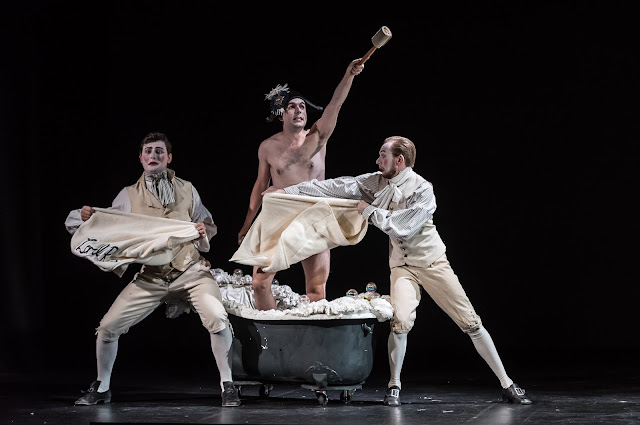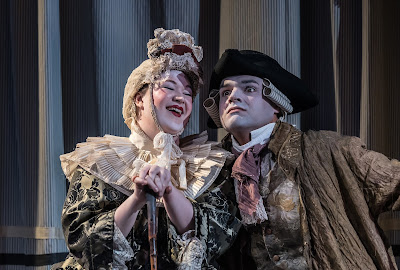 |
| English Eccentrics – British Youth Opera at the Peacock Theatre. Kieran Rayner (Lord Rokeby) with William Thomas and Steven Swindells. Photo: Clive Barda/ArenaPAL |
Reviewed by Robert Hugill on Sep 08 2016
Star rating:
Malcolm Williamson's anti-opera entertainment in an enterprising and imaginative staging
 |
| English Eccentrics – British Youth Opera at the Peacock Theatre. Edward Hughes (Beau Brummell) and Kieran Rayner (Etienne). Photo: Clive Barda/ArenaPAL |
Malcolm Williamson (1931-2003) was born in Australia, studying at the Sydney Conservatorium of Music with Eugene Goosens and moving to London in the 1950s where he studied with Elizabeth Lutyens and Erwin Stein. His jobs at this time included that of organist, proof-reader and cabaret pianist, a combination which perhaps is reflected in the eclecticism of his music.
'Eccentricity', wrote Edith Sitwell, 'exists particularly in the English, and partly, I think, because of that peculiar and satisfactory knowledge of infallibility that is the hallmark and birthright of the British nation.' Her book, technically a work of non-fiction but highly poetic in its language, was published in 1933. English Eccentrics was Williamson's second opera, written in 1964 (it was preceded in 1963 by Our Man in Havana). The opera was written for the Aldburgh Festival and performed in the Jubilee Hall, as such it was always intended as more of an entertainment (Peter Pears described it as something of an 'anti-opera'). Edward Greenfield in his 1964 review of the opera in Tempo describes it as being akin to a sophisticated game of charades.
Williamson's music for the piece is highly eclectic. Using only an ensemble of only seven players, violin (Scott Lowry), cello (Zoe Saubat), clarinet (Jordi Juan Perez), bassoon (Barosz Kwasecki), trumpet (etty wake), percussion (Tom Lee) and piano (Joe Howson), the result was a highly transparent texture, intended to allow the voices and, crucially, the text to come forward.
 |
| English Eccentrics – British Youth Opera at the Peacock Theatre. Polly Leech (The Countess of Desmond) and Matthew Buswell (Thomas Parr). Photo: Clive Barda/ArenaPAL |
Stuart Barker's production was fluid and full of lovely touches, using curtains to screen sections of the stage so the work flowed beautifully from scene to scene. Laura Jane Stanfield's neo-18th century costumes were highly imaginative and sometimes spectacular, with a striking use of ticking for all sorts of things including the striking mock 18th century wigs. The problem was that the different characters floated past at such a rate that it was sometimes bewildering to work out who they were, though Williamson's imaginative music included some deft characterisation. The work seemed to settle into its style with longer, more developed episodes.
The young cast worked hard and created just the right atmosphere, admirably slipping from character to character, musical style to musical style. One problem was that the projection of the text was patchy so that crucial sections of the text did not come over (a permanent grip of mine with performances at the Peacock Theatre). But over all I was impressed with the combination of energy, style and wit in the performance so that the two hours sped by delightfully. English Eccentrics may be a mad piece, as eccentric as its name, but the young performers ensured that we went home delighted.
The singers were ably supported by the instrumental septet which entered into the eclectic spirit of the piece with a will, presided over capably by Peter Robinson.
Malcolm Williamson's operas (and there are ten of them) are still unfairly neglected. I must commend British Youth Opera for its imagination and daring in their selection, and sheer verve in their execution. English Eccentrics remains, however, something of a curiosity albeit a delightful one, and I cannot help wishing that The Violins of St Jacques had been chosen.
Elsewhere on this blog:
- Charm: Ilona Domnich at Rhinegold Live - Concert review
- Moments of genius: Handel in Italy from London Early Opera - CD review
- The minutes simply sped by: Rossini's Semiramide at the BBC Proms - opera review
- Rising to the challenge of Britten's problem child: British Youth Opera in Owen Wingrave - opera review
- Remarkably poised and mature: Norwegian treble Aksel Rykkvin in Handel, Bach and Mozart - CD review
- Attractively jazz-streaked: Chamber music by Gernot Wolfgang - CD review
- Completely wonderful: Piazzolla's Maria de Buenos Aires - Opera review
- Innovative and profoundly moving: James MacMilllan's Since it was the day of preparation - CD review
- Transcending technical challenges: Boxwood and Brass in harmoniemusik - concert review
- Rossini's Barber: Pop-Up Opera - Opera review
- Agatha Christie goes to Valmouth/ The Dowager's Oyster - Opera review
- From Bohemia to Portugal: Baritone Ricardo Panela in recital - concert review
- Home




,%20William%20Morgan%20(Male%20Chorus)%20(c)%20Richard%20Hubert%20Smith.jpg)


,%20Giorgio%20Vasari,%20Palazzo%20Vecchio,%20Florence.jpg)

.jpg)
%20Benjamin%20Ealovega.jpg)

No comments:
Post a Comment